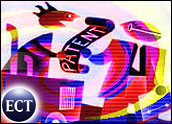
A group founded to develop and distribute ultra low-cost computers to children in developing countries is mulling possible commercial outlets for their machines, including using eBay as an inexpensive sales channel.
The One Laptop Per Child (OLPC) project, the brain child of Nicholas Negroponte, hopes to ship as many as 5 million of the low-priced notebook computers to be used by children in developing countries in Africa and elsewhere later this year.
Education Opportunity
The machine, now dubbed XO, is still being tweaked, but small batches have been made for testing by governments and for developers to work on.
Meanwhile, the group says while its first and most important goal remains distributing the machines to poor countries to boost educational systems and connect students to the rest of the world, it has begun to explore possible commercial sales.
One idea the group has floated would be to boost the sales price to developed countries to double what the PCs cost to make. In essence, buyers would be purchasing two notebooks, one of which they would receive. The other would go to a needy child overseas. The group may even offer to connect the buyer and the recipient of the second machine via e-mail.
The OLPC group was represented at this week’s International CES (Consumer Electronics Show) in Las Vegas, where the stripped-down machine stood in stark contrast to high-end gadgets such as plasma TVs, portable video players and next-generation smartphones.
The group said it would need a method of selling the machines that added as little cost as possible, and is exploring the possibility of using eBay, which has been a corporate partner of the OLPC for about 18 months.
Coming Attraction?
Negroponte, chairman and founder of OLPC, said the current focus is on the poorest markets, but that some thought has been given to possible commercial ventures starting sometime in 2008.
“Many commercial schemes have been considered and proposed that may surface in 2008 or beyond,” Negroponte said at CES.
The group believes there is a demand for the machines, which have been designed with ease of use, durability and low cost as priorities. Though the group originally hoped to be able to churn out a machine that cost US$100 to build, the current price is around $150.
However, Michail Bletsas, the project’s chief connectivity officer, said using traditional distribution methods would likely double the cost of selling the machine, undermining the efforts to use the sale price as subsidies.
While some PC makers offer bargain-rate machines at less than $500, such added costs may make the OLPC machine less desirable, even with the philanthropic element.
Using eBay may be a way to cut down on distribution costs and enable as much of the revenue as possible created by selling the PCs to be funneled back into the program.
A representative from eBay could not be reached for comment.
Almost There
Though the group has faced doubters from the time it was announced, thousands of the laptops, known as XO, have been ordered by governments and non-government organizations in places such as Libya, Uruguay, Nigeria, Thailand, Brazil and Pakistan. Last week, officials in Rwanda announced they would take part in the program as well.
Based on the Linux operating system, but capable of running Windows and other software, the PC has been designed to be used in an educational setting, but includes some advanced features, such as wireless networking and video conferencing capabilities.
OLPC said it was working with Google to provide services to the recipients of the machines, including e-mail accounts and space to create and display Web sites.
Negroponte announced the laptop initiative two years ago and said early backers would include chipmaker AMD, News Corp. and Google. eBay joined the group of corporate backers about a year later.
The laptops will be manufactured by Quanta Computer of Taiwan and OLPC hopes to release the final design for mass production by mid-year.
The effort has not been without setbacks along the way. In addition to being unable to hit the target cost — though some believe the price structure will be further reduced when mass production begins — some governments have balked at signing up. The organization has also decided to wait to target some of the largest markets — including China and India — until it has gained experience in distribution.
Those who have stopped short of embracing the effort may be holding out for more full-featured machines, according to Endpoint Technologies Associates analyst Roger Kay. The XO will be based on flash memory, have no hard drive or CD drive and be capable of storing limited data.
“There may be an expectation level in some places of what level of machine is going to be involved,” Kay said. In addition, OLPC has also made it clear it wants governments who sign on to offer support, such as by increasing Internet access where the machines will be used.
With a global scope, the effort was bound to run into some “political roadblocks along the way,” Kay added.




















































